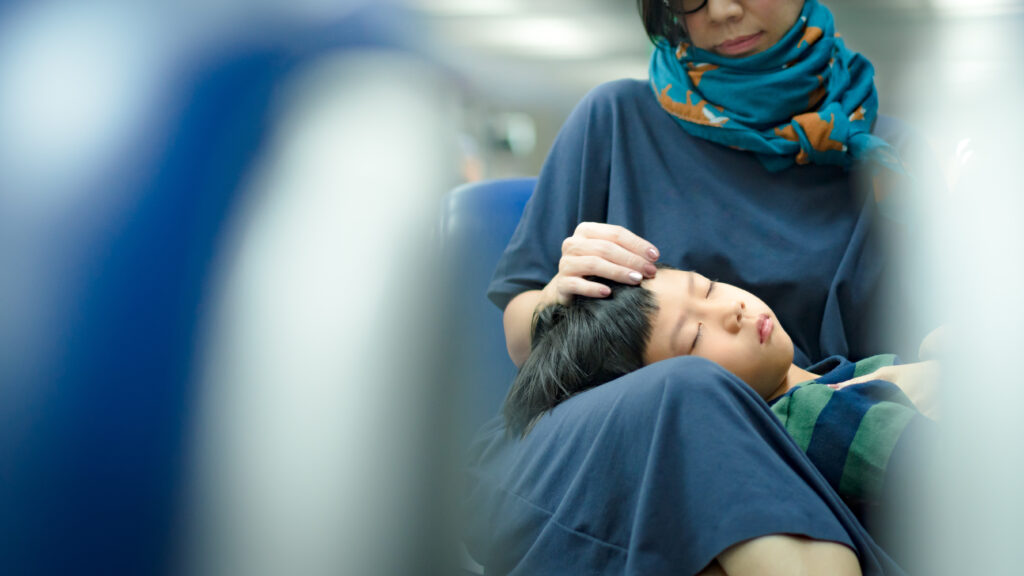Rachel Gross wants to clear up misconceptions about children and Covid-19. A pediatrician and population health researcher, she recalls a time four years ago when people didn’t think children could even contract the disease. Then, after accepting kids’ vulnerability to the virus, it was thought only adults could suffer from the myriad symptoms that persist or crop up post-infection, collectively known as long Covid.
Now that it’s clear kids can also develop long Covid, Gross wants to correct assumptions that the condition looks the same in adults as in children, no matter their age. In new research published Wednesday in JAMA, Gross and the RECOVER-Pediatrics Consortium report that school-age children and adolescents experience similar long Covid symptoms across multiple organ systems, but those symptoms cluster in ways that vary depending on their age while diverging to some degree from the pattern seen in adults.
advertisement
As part of the federally funded RECOVER initiative focused on post-acute sequelae of SARS-Cov-2, or PASC for short, the study found that school-age children (6 to 11 years old) with prolonged symptoms were more likely than uninfected children to experience headaches (57%); trouble with memory, focusing, and sleeping (44%); and abdominal pain (43%) at least four weeks after Covid. Infected adolescents (12 to 17 years old) more often had daytime fatigue, sleepiness, and low energy (80%); body, muscle, or joint pain (55%); and trouble with memory and focusing (47%) post-infection than uninfected peers.
Adults are also predominantly beset by fatigue, dizziness, brain fog, gastrointestinal problems, and loss of taste and smell, symptoms that overlap with some adolescents’ symptoms.
“This whole idea of whether PASC represents one unified condition or whether it reflects a group of unique phenotypes is really important because these phenotypic stratifications have lots of implications for investigations into the pathophysiologic processes that actually underlie long Covid,” Alicia Johnston, an infectious disease physician at Boston Children’s Hospital, told STAT about long Covid’s characteristics. She was not involved in the study. “That will help to define future clinical trial designs trying to understand these.”
advertisement
Gross told STAT the study’s purpose was to learn how to identify children experiencing long Covid and how these symptoms change over time. “Then we will be able to better understand the question we really want to know: Why is this happening?”
The data for the JAMA paper were drawn from electronic health records and caregiver reports from March 2022 through December 2023 for 5,376 children at 60 sites across the United States participating in RECOVER-Pediatrics. Overall, the RECOVER initiative has faced criticism for its slow pace and limited answers about causes, risks, and treatments. But after a subset of the JAMA study’s results was presented at the Pediatric Academic Societies 2024 Meeting in May, the pediatric arm of the massive effort won praise from a parents’ group.
“There is no other study like RECOVER for pediatrics in the world,” Megan Carmilani, a patient representative and founder of Long Covid Families, told Betsy Ladyzhets, a STAT contributor, praising the pediatric researchers as more responsive to feedback from patient representatives like her than those leading the adult cohort.
“We work very closely with families and caregivers and patient representatives in the pediatric study,” said Gross, an associate professor at New York University Grossman School of Medicine. “We hear from them how challenging it is for families and children experiencing these debilitating symptoms, and that this research can’t come fast enough to really help them.”
Johnston sees that need in her practice at Boston Children’s every day.
“We’re four years in, and there’s a lot that we still don’t know about long Covid. I mean, we still don’t have clinical trials looking at effective therapies in kids really at all, and not many in adults, for that matter,” she said, listing unknowns about the effects of reinfection, how physiologic or psychological stress can affect the waxing and waning symptoms of long Covid, the role of Covid vaccination in preventing long Covid, and the risk of long Covid associated with different strains of Covid.
advertisement
Wednesday’s JAMA paper did not set out to determine incidence of long Covid in children, but other research estimates up to 5.8 million kids could have long Covid. If 2% to 5% of children in the U.S. are living with long Covid, that would still add up to millions of kids, making it not a rare disease. While the study was focused on building a foundation for further research and not on creating tools for current practice, Johnston sees an additional value down the road for diagnosing long Covid patients.
“That is hugely important to get this diagnosis correct because long Covid is recognized as a disability” by the American Disabilities Act, she said. “Having this diagnosis may allow affected individuals to get certain protections and accommodations. It will be really important.”
Asked why children might feel long Covid differently depending on their age, Gross said answering that question is one of the next research targets. “Children of these different ages are growing, their brains are developing, there’s lots of changes,” she said. “It could be changes related to their immune systems. It could be changes related to onset of puberty and hormonal changes.”
An immediate next step will look at what’s happening in the youngest children, from birth to 5 years old, to decipher mechanisms and tailor treatments.
Johnston and Gross expressed concern about adolescents nearing adulthood. “We know that having adverse experiences, experiencing a chronic illness in childhood can impact children as they grow and become adults. This is really a public health crisis,” Gross said. “It’s really going to be affecting the health of generations to come for decades to come. And so that’s why it is so critically important not to forget that we really need this research for children.”
STAT’s coverage of chronic health issues is supported by a grant from Bloomberg Philanthropies. Our financial supporters are not involved in any decisions about our journalism.
advertisement

